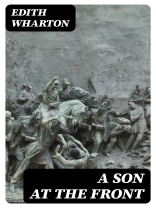In ‘A Son at the Front, ‘ Edith Wharton explores the profound emotional and social upheaval experienced during World War I through the lens of affluent American society. The novel combines Wharton’s characteristic psychological depth with a poignant critique of the romanticization of war, as it delves into the struggles of a father grappling with his son’s potential involvement in the conflict. Wharton’s vivid prose and sharp observations provide readers with a detailed portrayal of the moral dilemmas faced by those left behind, set against the backdrop of a world irrevocably altered by warfare. As a work published in 1923, it reflects her keen awareness of the changing narratives surrounding military valor and sacrifice, sharply contrasting with the prevailing romantic ideals of combat at the time. Edith Wharton, an influential literary figure, was renowned for her keen social commentary and exploration of complex characters. Her experiences living through World War I deeply informed her perspectives, as she felt the tensions surrounding patriotism, class, and individual sacrifice. This personal engagement with the war, coupled with her acute understanding of human psychology, rendered her well-equipped to tackle such serious themes in her fiction, ultimately reflecting the disillusionment of a generation. ‘A Son at the Front’ is a compelling read for those interested in the intersection of literature and historical context. Wharton’s poignant exploration of loss and resilience offers profound insights into the human condition while challenging our understanding of courage in the face of adversity. Readers will find themselves reflecting on the complexities of love, duty, and the price of conflict, making this work both timeless and relevant.
About the author
Edith Wharton, born Edith Newbold Jones on January 24, 1862, in New York City, emerged as a preeminent American writer of the early 20th century. Coming from a wealthy and socially prominent family, Wharton broke barriers in a male-dominated literary world, employing keen social insight and critical acumen in her prolific body of work. Her narratives often dissect the intricacies of society, morality, and personal relationships, set against the backdrops of the upper-class milieu she knew intimately. A Son at the Front, published in 1923, illustrates Wharton’s exploration of World War I’s impact on society and the personal dilemmas faced by her characters. Unlike some of her more renowned novels such as ‘The Age of Innocence’ and ‘Ethan Frome, ‘ this work foregrounds her insight into the ravages of war and its reverberations on family and societal structures. Wharton’s literary style is marked by its careful structure, incisive irony, and meticulous character development, making her fiction both precise and emotionally resonant. Her contribution to literature was recognized with a Pulitzer Prize in 1921 for ‘The Age of Innocence, ‘ making her the first woman to receive this honor. Wharton’s legacy endures through her sixty-plus volumes of novels, short stories, essays, and other non-fiction, solidifying her stature in American letters.












